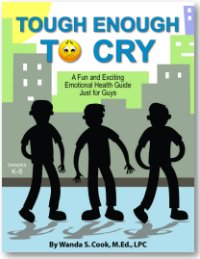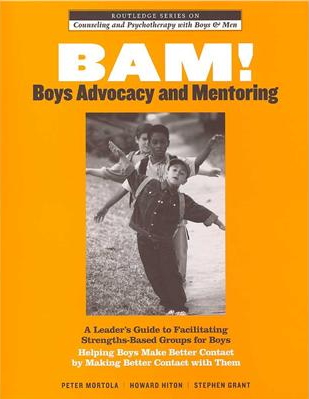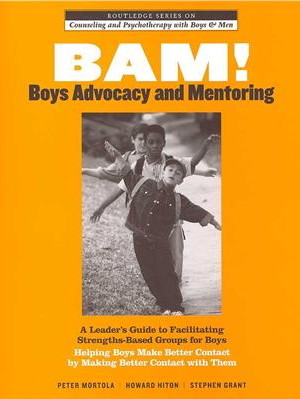Tough Enough To Cry gives counselors and therapists the tools they need to understand and remediate issues that boys deal with in everyday life.
This valuable resource (adaptable for use with girls) discusses 50 human emotions and appropriate ways to handle each of them.
Tough Enough To Cry includes:
- A 10-step format for presenting each of the 50 lessons
- My Feelings Have Faces illustrated chart to help students identify their feelings
- Three pre-screening charts to help facilitators and teachers identify feelings that must be addressed
- Group counseling topics to be used with the 10 concerns most common among boys
- Emotional profiles to help students in Grades K-2 and 3-6 better understand their emotions
- Daily emotional warm-ups that enable classroom teachers to use the program
- Shout-outs—personal testimonies of boys of various nationalities, ethnic heritages, and socioeconomic circumstances
- ASCA Standards
- CD of all reproducible materials
This all-inclusive, research-based program gives facilitators the tools they need to identify and respond to boys’ feelings.
Appropriate for: Grades K-6. For use in: Individual counseling, small-group counseling, classroom guidance
Book Review
“Really . . . this book is amazing! I finally have the right tool to teach my students how to deal with anger, bullying, disappointment and other emotions that they may secretly experience. The personal testimonies in the book called “shout outs“ have helped my students share about their own personal struggles; the emotional profiles have helped them pinpoint the feelings that challenge them most. Tough Enough to Cry has even helped me teach my students how to show empathy. Thanks, Mrs. Cook, for creating a resource to help rescue our hurting boys.”
J. Benjamin, GAP Teacher
ASCA Standards for Tough Enough To Cry
ACADEMIC DEVELOPMENT
Standard A: Students will acquire the attitudes, knowledge and skills that contribute to effective learning in school and across the life span.
- A:A1 Improve Academic Self-Concept
- A:A1.5 Identify attitudes and behaviors that lead to successful learning
- A:A2 Acquire For Improving Learning
- A:A2.3 Use communications skills to know when and how to ask for help when needed
- A:A3 Achieve School Success
- A:A3.1 Take responsibility for their actions
- A:A3.2 Demonstrate the ability to work independently, as well as the ability to work cooperatively with other students
- A:A3.5 Share knowledge
Standard B: Students will complete school with the academic
preparation essential to choose from a wide range of substantial post- secondary options, including college.
- A:B1 Improve Learning
- A:B1.1 Demonstrate the motivation to achieve individual potential
- A:B1.4 Seek information and support from faculty, staff, family and peers
CAREER DEVELOPMENT
Standard A: Students will acquire the skills to investigate the world of work in relation to knowledge of self and to make informed career decisions.
- C:A1 Develop Career Awareness
- C:A1.4 Learn how to interact and work cooperatively in teams
- C:A1.5 Learn to make decisions
- C:A1.6 Learn how to set goals
- C:A1.7 Understand the importance of planning
- C:A2 Develop Employment Readiness
- C:A2.1 Acquire employability skills such as working on a team, problem-solving and organizational skills
PERSONAL/SOCIAL DEVELOPMENT
Standard A: Students will acquire the knowledge, attitudes and interpersonal skills to help them understand and respect self and others.
- PS:A1 Acquire Self-Knowledge
- PS:A1.1 Develop positive attitudes toward self as a unique and worthy person
- PS:A1.2 Identify values, attitudes and beliefs
- PS:A1.3 Learn the goal-setting process
- PS:A1.4 Understand change is a part of growth
- PS:A1.5 Identify and express feelings
- PS:A1.6 Distinguish between appropriate and inappropriate behavior
- PS:A1.7 Recognize personal boundaries, rights and privacy needs
- PS:A1.8 Understand the need for self-control and how to practice it
- PS:A1.9 Demonstrate cooperative behavior in groups
- PS:A1.10 Identify personal strengths and assets
- PS:A1.11 Identify and discuss changing personal and social roles
- PS:A1.12 Identify and recognize changing family roles
- PS:A2 Acquire Interpersonal Skills
- PS:A2.1 Recognize that everyone has rights and responsibilities
- PS:A2.2 Respect alternative points of view
- PS:A2.3 Recognize, accept, respect and appreciate individual differences
- PS:A2.4 Recognize, accept and appreciate ethnic and cultural diversity
- PS:A2.5 Recognize and respect differences in various family configurations
- PS:A2.6 Use effective communications skills
- PS:A2.7 Know that communication involves speaking, listening and nonverbal behavior
- PS:A2.8 Learn how to make and keep friends
Standard B: Students will make decisions, set goals and take necessary action to achieve goals.
- PS:B1 Self-Knowledge Application
- PS:B1.1 Use a decision-making and problem-solving model
- PS:B1.2 Understand consequences of decisions and choices
- PS:B1.3 Identify alternative solutions to a problem
- PS:B1.4 Develop effective coping skills for dealing with problems
- PS:B1.5 Demonstrate when, where and how to seek help for solving problems and making decisions
- PS:B1.6 Know how to apply conflict resolution skills
- PS:B1.7 Demonstrate a respect and appreciation for individual and cultural differences
- PS:B1.8 Know when peer pressure is influencing a decision
- PS:B1.9 Identify long- and short-term goals
- PS:B1.10 Identify alternative ways of achieving goals
- PS:B1.11 Use persistence and perseverance in acquiring knowledge and skills
- PS:B1.12 Develop an action plan to set and achieve realistic goals
Standard C: Students will understand safety and survival skills.
- PS:C1 Acquire Personal Safety Skills
- PS:C1.2 Learn about the relationship between rules, laws, safety and the protection of rights of the individual
- PS:C1.3 Learn about the differences between appropriate and inappropriate physical contact
- PS:C1.4 Demonstrate the ability to set boundaries, rights and personal privacy
- PS:C1.5 Differentiate between situations requiring peer support and situations requiring adult professional help
- PS:C1.6 Identify resource people in the school and community, and know how to seek their help
- PS:C1.7 Apply effective problem-solving and decision-making skills to make safe and healthy choices
- PS:C1.8 Learn about the emotional and physical dangers of substance use and abuse
- PS:C1.9 Learn how to cope with peer pressure
- PS:C1.10 Learn techniques for managing stress and conflict
- PS:C1.11 Learn coping skills for managing life events
American School Counselor Association (2004). ASCA National Standards for Students. Alexandria, VA: Copyright © 2004 by the American School Counselor Association




